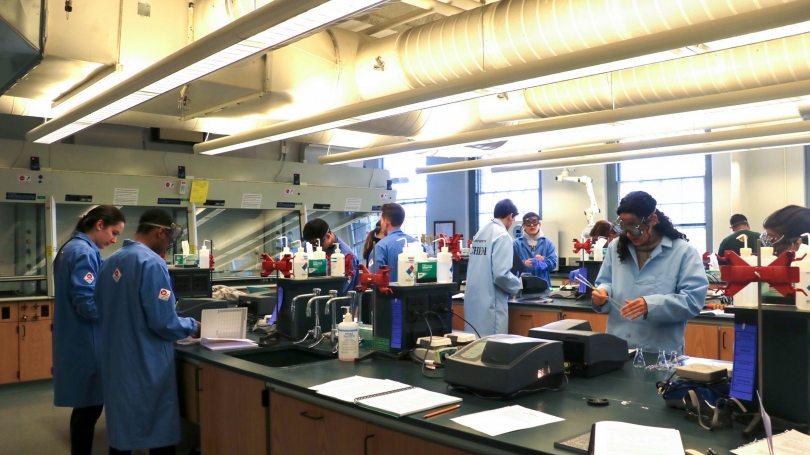Dartmouth is known for its focus on undergraduates, a trait that allows students to get involved with research early in their Dartmouth careers. However, on-campus research is one of the many opportunities disrupted by the pandemic.
On March 23, Dartmouth ramped down on-campus research. Starting July 1, the College put new guidelines in place for reopening laboratory-based research, which permitted research groups to resume some work but prohibited undergraduate students from engaging in on-campus research.
However, these restrictions have not completely halted undergraduate research. Instead, students are finding ways to remain engaged in their research remotely. Margaret Funnell, a psychological and brain sciences professor and director of Undergraduate Advising and Research, noted that there has been a recent increase in the number of students applying for research assistantships.
"Since the pandemic, what we've seen is a really big shift away from leave-term grants and toward the part-time research assistantships, like the sophomore and junior research scholars," Funnell said. "We've actually seen about double the amount of applicants."
Funnell added that while in-person laboratory research is not possible for undergraduates at the moment, students are finding other ways to stay involved.
"Right now, I would say that there are a lot of opportunities for students," she said. "Everything that we're funding right now is remote, and even lab-based research has been shifted to remote. Students are analyzing data, writing programs, designing experiments — everything except actually being in the lab. I don't think anybody seems to be running out of things to do."
Jennifer Lee '22 is currently conducting research with government professor Brendan Nyhan through the James O. Freedman Presidential Scholars program. Her research project is focused on exploring partisan perceptions of economic and social mobility in the U.S.
Lee and her team — which consists of Nyhan and three other presidential scholars — meet twice a week via Zoom to discuss findings and address questions, and they also communicate through Slack. Overall, Lee expressed that she has "been really impressed with how easily accessible [her] research professor is."
For incoming freshmen who may be new to research, getting involved in remote research can seem like a daunting task. Luckily, research opportunities geared toward freshmen, such as Dartmouth's Women in Science Project, are still set to happen this year. According to Funnell, the structure of WISP during its final term for the year will depend on campus regulations come spring.
Funnell added that WISP will provide freshmen with a broad overview of what research is like at Dartmouth. During the winter term, students can learn about human subjects research and the programming and computational skills often used in labs and schedule virtual lab tours. In the spring term, WISP interns may be able to transition to on-campus lab work or remote lab work, depending on the nature of the pandemic.
Another research program designed for freshmen is the First Year Research in Engineering Experience, which provides hands-on experience and mentoring in engineering research. Students may apply to either FYREE or WISP, but not both.
Outside of these programs, Funnell added that many research opportunities come from relationships formed with professors. However, remote classes make forging these connections difficult. To address this concern, some professors are considering creating brief podcasts explaining their research so that students can get to know them better, according to Funnell.
Although the format of undergraduate research will look different from previous years, freshmen are still excited to get involved. Ericka Asmus '24 noted that she will prioritize getting involved in undergraduate research despite the fact freshmen will not be able to live on campus in the winter.
"The things that happen in theory versus what happens in real life can be very different sometimes, and trying to troubleshoot why that is, is a very good skill," Asmus said. "Even if it's a little different, even if things are kind of choppy because I won't be [on campus] in the winter, I think it's still better to participate in something like [research] than to not participate in it at all."
Funnell highlighted that the research community is one of the most important aspects of WISP.
"A lot of [WISP] is really about trying to build a community and also build mentoring relationships," she said. "Even without being in a lab, you can do those things, so those are the things we're really going to focus on."
Funnell added that despite the remote format, undergraduate research continues to keep both students and faculty engaged.
"Students are really engaged in research, [and] faculty are really finding ways to keep them engaged," she said. "The students are sticking with it and seem to be getting a lot out of it. So far, the things I worried about haven't happened."
See the story in The Dartmouth: https://www.thedartmouth.com/article/2020/09/undergraduates-pursue-remote-research-opportunities
